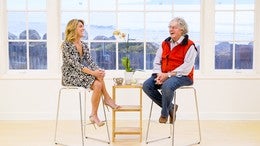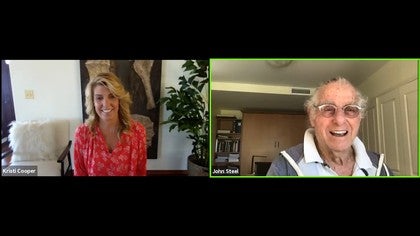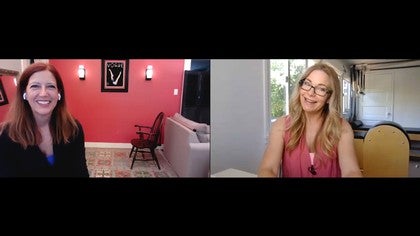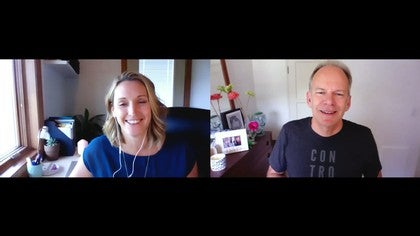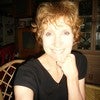Description
Links and Resources
About This Video
Transcript
Read Full Transcript
So, I'm gonna get this show on the road and start by just saying thank you, John, for being here and to everybody else. Thank you so much for being here. And my guest today is the first of what I hope will be more in the in a new webinar series of the Pilates Legacy Project, program or webinar series. And John Steel is someone who has a unique perspective on all of Pilates for lots of reasons, but I'm gonna back up and say, I'm gonna call him my friend. And I'm gonna let, you all know that Amy Havens is currently he's his teacher.
And he has been taking Pilates for 60 years or so. He is a lawyer by trade. And I'll that come back round and say that 60 years of taking Pilates started with Joseph Pilates and Clara Pilates themselves. And so I've actually had the honor of interviewing John before, a couple times are on PilatesAnytime they're among my favorites, with a lot of detail that we probably won't get to today. But he, I promised him, I would bring him back if you finish this book he was talking about, and the book is finished, it is available already on Amazon "Caged Lion." "Caged Lion" and then try not to look for all the post it notes.
It's what, 250 pages maybe. And it took me a long time because there's so much in here that is really reflective of our industry, reflective of the hardiness of a Pilates teacher, reflective of the passion of a person who knows what it is to practice Pilates and John Steel represents everything in that. So without further ado, thanks, Amy for continuing to teach and thanks Joe and Clara for starting to teach him thank you John Steel for being here. It's my pleasure, you know that. You grabbed me years ago at a PMA.
And said "Hey, can I interview?" I didn't have any idea who you were or I think PilatesAnyTime was just about, starting and you started this wonderful legacy project and told me, we're interested in the history of thing. And I thought, wow, that's great, because history got lost for many, many years. And one of the reasons that I got motivated to write the book was to put the history back before people who teach this mostly, it's important to know where it came from. I do want the "Caged Lion" itself. It might be an obvious title for some it.
I asked you I remember had the nugget one day why that title and he said, read the book and it is in the book for everyone that knows. So I'm gonna leave it for you 'cause it's a nice explanation. But also, if you just saw the title and didn't know anything, the title from me it permeates throughout the entire story, of this fierce man, this man who he was somehow held back along the way, never mind his affinity for watching animals. But there's more that he says in the story. And that's what's so exciting about this book.
And that's really why I wanted to share it. That there's more in here than I knew. And I'm not the one to say I know much. But I did think I knew a fair amount about Pilates. And there was more right in here, so, I won't reveal all of it.
But I do wanna know if you'll expand on why did you, what really inspired you to write the book? And when did you say okay, yeah, I gotta do this? When you're being a lawyer for almost 60 years or longer, 61 I think. And certain didn't say what happened was Kevin Bowen gave me a call, I think sometime around April or something of 2007. And he said, I'd like to ask you to be the keynote speaker at our next PMA, which will be in Florida and I think of October or November, I thought, gee, I was sort of hiding.
I wasn't hiding on purpose, but I was just out of the whole Pilates thing other than doing it with the teacher. But I thought, oh, that'll be great. Get the trip to Florida and blah, blah, blah. And so, I said, sure, I'd be honored and over the Summer is started outline everything I needed to talk about, I was a little I had a little trouble trying to figure out what I should say what I should talk about. I think what Kevin wanted was a kind of a picture of what Joe and Clara were like, a picture of what this studio was like, a picture of how it worked what was the procedure?
So I outlined that I had three to four pages of single spaced outline and that was gonna be my talk. I also had some photographs, some of which are in the book now. And they were gonna put them up on the screen. And so I went to, I forget where it was from Florida, very big convention center. And it was the keynote speech.
Yes, in the evening of the first day and there were three or 400 people there, teachers, which impressed me and now I was told that there were people from 30 to 40 countries. And I realized that that moment that this was the 40th anniversary right close to the 40th anniversary of Joe's death. And I got extremely emotional about that then. And the fact that there were 400 people there when Joe died, there were maybe 50 people outside of the dance community. 50 people in the world who even knew about Pilates and here there were 400 teachers who had spent their good deal of money to come get their education.
Continuing education credits, and that was really like, wow, this is amazing. And I got up in front of the audience, I had my outline in front of me. And I just thought, let me ask a few questions. So I first question I asked was how many people here know that Pilates was a person? About a half the audience stuck up their hand.
And I was really taken aback by that. Only half the people who taught this and I think knew Pilates was a person, they thought it was a thing. So I said, all right all of you with your hands up, how many of you think he's alive? Half of those people kept their hand. So that disturbed me no end, here's the man that created all of this and only a quarter of the audience knew he was a person who would die.
And I thought about that and kind of changed my whole approach to my talk. The talk went on in the theater till they threw us out, which we got one over time. And then we went back in the lobby, and we, I sat, they brought a chair and everyone else out floor and we talked for two or three total house. Let me ask you this go ahead. Pardon for me?
I wanted ask something but go ahead. Oh, and then people said, "You wanna write a book." I didn't even think about it then. That's what went into my mind and I think it took me a year or so before I really thought yeah, maybe I wanna write a book why not try that. And that's where it came from but I felt always that I didn't owe Joe anything but I felt it was his due to be brought back into the story of Pilates for many reasons. One of the reasons and a lot of that in the book is he not only invented these exercises and the machines.
And he developed a way of teaching people. So that I felt was important. And that's why did, took me quite a while to write the book. But. (chuckles) Thank you.
You answered the second question I was gonna ask which is why more in depth but can you give us a glimpse of your stance with him? Because why I'm asking this is what was different for me in this book is this storytelling that comes through it and it is not, I mean, you obviously can't be in his head, but it really feels like you are based on your actual experiences with him. So I'm just wondering if you have, anything that because anyone could say write a book, you're interesting or that's interesting and you know but it take something else to. You had experiences with Joe. And just curious if there's any example you could give us a time where you understood the depth of what Joe felt about this work that you felt that had to do based on a book that you wrote.
Well, it's a very difficult thing to answer find one example. I didn't think much about anything while I was learning a Pilates. There were several reasons, Joe didn't allow you to think that's the last thing he wanted to do, he wouldn't let you take notes. If he saw me furrow my brow. He got angry at me.
He didn't want you to think about it just let it in. Just do it, let it in. So I didn't think much about it. And over the years I didn't think much about it till I started to write this book. And in that process I started to think about Joe and the other thing I had to think about, and I read about this or hear about it from what I had think about myself.
Where was I? Why did I do this? Why did I go back that second time? Why did I get involved with this thing? What was in me that did that, what was in me that wanted to write that book?
Was that something Joe did? Was that something is exercise did? I touch on that frequently in the book and it's not 100% clear now. Now inside Joe's head I never thought to think about what Joe was thinking about. I was like, granted to him in some way he was an old man, my age now, and I was a 30 year old, kind of hot shot, arrogant, preppy little brat.
And it was like, what the hell's he thinking about? I never thought about I just tried to listen to him. I tried to do what he was asking me to do. I tried not to give any hint that I was trying to memorize what you did, or how many springs with the teaser? Or what I just wanted to say get through the sections at the beginning.
And they're all supposed to be a little wacky. So he had his wackiness. Can you mean I don't really want to take him down the river but I am trying to figure out you're in the midst of you trying to decide where you were and why you started in 1963 your parents for going before you, had a neck injury? I believe it was. And you almost did it.
I think it was mom and then you kept going back despite maybe not loving it originally. So, when you went to write the book or even why you went back, it doesn't have to be about the book, but at what angle do you try? How do you get that all out? When in the next four years, less than that I think he's now, you're having dinner with him. You're going to the Zoo with him.
He's almost like he's mentoring you. And yet you don't wanna be a Pilates teacher. You're on your way to law school or in law school. So I'm just trying to figure out what did you decide on in the book like where did you decide to land in your mind, on sharing information for other people beyond it says do you're telling a really interesting story here and I'm just curious how you came to it and what you think it is. I don't think I give that really too much thought either.
I mean, but it kept going, it had its own momentum. Now a group of us ran it. John Winner, sort of did the teaching, Clara was there. It just kept going. And no one thought, one day this is gonna be except, we knew Joe had thought that but we didn't.
So, did it in the book. Sorry, I didn't mean to speak but no, but didn't you know what's gonna happen? Joe knew it, but you didn't. Well, Joe had this thing, that one day everyone would be doing Pilates. Okay.
And we thought it was nuts. (laughs) I mean, no one was doing Pilates, 50 people at the best. And so the people were trying to keep it going five or 10 of us. All we ever thought about was to keep the gym open so that we selfishly could go and do our thing. Tell me who they were?
Tell me who they were not by name, but just where they Pilates teachers? Were they wanting to be Pilates teachers? I'm just trying to help everyone understand this time right. You're right. Joe has passed.
You are now wanting to do what? And I can tell you who they, I can describe who they were... They're all a bunch of people in the between 30 and 45 years old. Many of them came from Broadway, because one of the big Broadway composers was there. Many of them came from the arts and there were a few very prominent society ladies who came very regularly and the Barley World was not there.
George Balanchine would occasionally be there. People would be there the were dances or were choreographers or what, that no one knew who they were. I mean, we couldn't talk to anybody. We're not allowed to talk. So we didn't know who anyone was.
No one was ever introduced. There weren't classes. So I could have been on a reformer next to George Balanchine or Jonathan Burrows or any of these people and never even known it. Now tell me, I think that's amazing. And I think it's true in some cities but not in others.
And I wonder though, there was a group of you that decided to help keep the studio alive after just passed. And that's really kind of what I'm into. I think that's interesting, because it paved the way for Amy and Rachel and it pays the way for or maybe it didn't, I'm trying to find out like, Joe's gone. And now we have a handful of leaders in our industry that benefited from it just staying alive through this period of time, Romana and everything. Yeah, so that's the nugget I'm trying to like, 'cause it's interesting to me that you were not a teacher you wanted to work out selfishly in your words.
But it was that all that group of people. Yes. That wanted to save it. That's what I'm trying to. That people have wanted to say but were myself, my father, a fellow named Dan Reed who was a big manufacturer of women's clothing.
He was a very good business man. There were two contractors, big time contractors, man. There was a Cathy Montezemolo, who was a Editor at Vogue and a very socially prominent person and her sister and they were famous sisters in the world of society and a few other people Jim Lipton, Sai Coleman, and that was about the group. And that was it, we said what can we do and we said well we just keep going. And that's, we kept going, John Winter was happy to keep going hand of them was happy to keep going.
We had not only a selfish problem which is no, I don't you mean it pejoratively, but selfish 'cause we wanted a place to work out. We weren't here to build this thing for the world. But we had a problem for Clara. He left nothing for her. Nothing.
So what was gonna keep her going what was gonna pay her, rent? We needed something to do that. And we did that for her too. She was very much in our thoughts the whole time. So we did that and it just kept going.
And then it started peter out. And at that point, we can do a critical pass in all this you can read about more detail, and then we had to hire somebody. And that was impossible until Clara said, "Why don't you call this person "who Joe taught when she was a teenager." And that was Romana. And it's an interesting story, how we got Romana. That was not easy.
And that was it. That's what she saved it. So that's when we moved, the contractors built this beautiful space, the business people set up a business plan, the lawyer me set this and that. And that's her talent kept her alive. I find that truly fascinating because yes Ramana, for sure.
And also, there was one step before it that you don't hear much about. And that was that group of people that were like. Yeah. We still wanna work out. So, I find it really interesting.
Well that was it. Yeah. Yeah, that's great. That's great. Before we go into questions, which is gonna happen any moment now, I want to ask you what do you want as like you wrote the book.
I do think people are gonna read it. I think, I'm not really here to sell books, I'm here to make sure people get good Pilates. I'll sell the book. But I feel like I learned a lot and it puts me in a position that I understand my personal self not my PilatesAnyTime so in a position to understand better, again I keep saying how hardy we are, we're in a tough time right now and it's just chocking, what I learned in here in a few pages around what you all did that group but then Ron Fletcher, Cathy, Amy done, but everyone has done along the way and I'm fascinated with that tree of life that we're all in so, thank you for that. But is it when you wrote this when you were finished with it, or even what do you want someone who maybe didn't know?
I mean, I think most people on this program are gonna know that Joe's as a person. But so what would you hope for? I know you even sell books, you care very much about this man. And that story is also in here, but what would you hope for that others could know that would make you write a book? Well, I hope and I said this at the end.
I hope that I've resurrected him as a person and not just the technician who, invented the exercises and equipment. His person is extremely interesting in the sense of, he came from absolutely nothing. He arrived in this country 40 some two years old with nothing and look what he did. I mean, I think when you can touch his humanity, you touch everyone as human, the potential that everyone has. And I cannot want people to be touched by, I'm touch by.
And I think that would be great. And I think for the professionals that teach this and the people who spend money and effort opening studios, I think it's very good for them to understand how important it is what they're doing. What it is that they should have a good grasp of that. But I also think that people who do Pilates supposedly 10 million in the United States do Pilates. I think it's important for them to know that the teacher that they have in front of them the person that is guiding them, has dug into this thing.
It's not that they've learned a dance routine, and they're, oops, excuse me. Up there teaching you how to do certain steps. They're guiding you towards something else and you've got to find that out. But they're doing something a lot more than teaching you to do the hundred properly or the teaser, or whatever it is that they're doing to help you in your life. And I'd like people would understand that.
That's what deep depth Pilates is all about I love, I can't stop that. I just think that that's gonna come through in this book. No doubt about it. I'm gonna leave it at that's too good. I'm gonna just switch us to some a couple of questions and then I would love to bring in my friend Jeff.
Madeline Black, let's see. Again, I've never done this but Madeline Black is asking, did you ever meet Dolores Corry? She was known as Nacho Corry. She worked at Bendel's and I think was the one who may be pestered Cathy or might have been vice versa, but I think it was Nacho Corry. Did you ever get to meet her?
I know, I saw her. But again-- How you'd see her? Well, I think she came up to the studio or something. But Joe didn't know anyone's name. So he will never will introduce to anyone because he didn't know their name at work.
He knew my name I guess over the years and he knew my father and mother's name most of the time so I don't know if I ever met her, I think, I did know of her and I knew of the Bendel's Studio, and I knew when Cathy took it over, but I and Nigel opened it. Nigel was the first one there.
Rittenhouse has another one. A couple actually. He'd love to hear if you know anything more about the Pilates foundation to physical fitness. I'm just gonna read it straight, which John Steel tried to revitalize. Are they actually owners of this method as just a Pilates the foundation to use his name and exercise system?
Can you tell us about the Pilates foundation? Well, the one before it can annulments. Before? Yeah, he told me one day on one of the walks Who's, Joe? Joe.
On one of the walks when I'm breathing hard to keep up with him and avoid getting run over. He told me about these people who formed this thing and wanted to take away his material and use his material. And he spewed out a whole bunch of anger about the whole thing. He was very angry about them. And then some how in the early process of getting going after he died.
I had some contact with some of those individuals and I got the other side of the story. A bit of it's in the book. I never went in to answer the question. I know very, very little about it. He didn't talk about it accept this I just said very angrily.
The other people also were very angry at him because they've gone down this road. They tried very hard to preserve his work to create an archive, a library. They raised money, they had meetings, they did all of these things. I think the head of it all with a guy named Ralph Hollander, and he just walked out on him. He couldn't stand anyone infringing on his absolute control over this thing.
And what they were doing. They weren't taking a bit of his control away. But they were trying to preserve it. They were trying to get some method of keeping it going after his death. And he wouldn't stand for it.
He didn't think he was gonna die. You've said that, do you really mean that? He did not think he was. Well, he thought maybe 140, 150 something like that. Why can't I think that.
(laughs) Okay, well then, thank you. That was it. I'll go with another one from Reiner. Did you know about Carola Trier you at this time? And Joseph Pilates has ever talked about Carola?
If and then he has follow up questions but let's just start there. I knew about it her. Vaguely he did not talk about it. He didn't talk about any other teacher. He did. Okay.
I mean, he didn't talk about Mary, he didn't talk about anyone Cathy anyone. So it wasn't like he said, oh, I can't fit you in go down to Carola's. That's sort of sorry, right now. It's not quite your question that's total different from that. Because he was if you knew Carola's studio would this have been an alternative to send your job?
Sorry, right? Except for Bendel's. Okay. I didn't think there was any other studio. Option.
I didn't know about purchase. I didn't know, no. Okay. Cathy Strack is here. Hi, Cathy.
She wrote the book on Romana? Do you have any advice for us as to how Pilate teachers and practitioners can keep it going in these times? Well, is going so far beyond any imagination I ever had. That it would, existence and the purpose and the integrity of PMA has just been an incredibly important guiding light for this very diverse, very, in some ways, very inventive, very clever community. I mean, if you look at the names of the 10,000 studios in the United States.
You'll see people have all kinds of ideas about Pilates. I think that should be encouraged. I think that's the lifeblood here. That what makes this so robust that the people are thinking of different ways of applying and have different ways of teaching you. And I think that's important.
This is not teaching kids how to waltz or or do the fox rod. This is something else. And the only way it stays viable is if teachers continue to explore and learn how to cue people how to get them to do what is good for him basically what helps him and Joe was a master of that. He could lead a horse to water and make it drink. Now, that, to me was an incredible skill.
I was, I mean, that's what I experienced from him. And like, I think, for teachers to constantly get the pleasure of learning to do that. And seeing how other teachers do it. I mean, what you do is anytime. It's fantastic, it provides everybody with the mean supporting everyone else who brings us all together.
And I always say I've spoken about this every time I speak a PMA or anything to get into the world of oh, classical and it hasn't to be classical don't do it this way. Don't do it that way. That's bad. Just plain ordinary bad and should be watched avoided and the people who do that should be taught to and kind of try to bring everyone together. It's PMA has done a great job.
You're doing a fantastic job. And Mary teaches something very different than someone else. But you've got a huge amount both of them. So let's have it all. That's my advice.
Keep going. Let's have it all keep going. I might make a bumper sticker. (laughs) Thank you. Let me add a couple of questions from Elizabeth Larkham is also here.
Thank you, Elizabeth. Let's see. I'm gonna start with one. Well, this one, John, you've been practicing Pilates for seven less or more decades and are the same age now that Joe was when you started studying with him? What are your reflections from your experience of a lifetime of Pilates practice?
Thank you. Well, in the way I just talked about, I mean, when I started it was a very rigid very program thing. And you dug into it not from variety or not. You dug into it, within that confines in that in the course of this time yeah, I practice over the period over the period but over 20 years in there where I didn't do very much, it was dormant I did not find a teacher. I was busy with other stuff.
What I find now is, it's lost some of that intensity that you had when you did that exact same reform or routine all the time. But it wasn't a business. It didn't attract anyone new. It had its shortcomings it was, very private in some way. Now, it's a wonderful public thing.
It's social in many areas, people go to pilates to go to classes, to see other people. It's brought in thousands of teachers we only have one, really one teacher when I did Joe and Clara a little, but Joe was in there clarity didn't teach much and then, this is a whole different thing and I think we're on collector gets an awful lot of credit. I do credit him a lot in the book for kind of opening it up. Just using a towel. Oh, my God if Joe saw him using a towel he will torn them apart, but just doing that.
I mean, yeah, it's greatly changed. It's now but I can go anywhere back then if I didn't live in New York, I couldn't do Pilates. Now, I can go to some little town in the south of Spain or France and I can do Pilates. Can you expand on that I think you answered Elizabeth's question, but I also wanna know like your own personal experience. You've been doing it longer than anybody I know.
And you continue to work with my dear friend Amy. I guess the easy question is why? Or how has it changed for you personally tagging on to Elizabeth's question over the years? Is it the same to you? Is it a practice?
Can you characterize it at all for you? Yeah, is the same to me I mean, I seek to teachers who have this intuitive feeling about it, they have something within them about the depth of this connection to your whole inner being about the exercise. I've gone to one of the teachers who just say, do this, don't grimace. Don't do this, don't do that. Hold your hands.
And I can sense right away that they're not for me, they may be for other people. They may be fine, but they're not for me. So I feel, pretty much the same about whether at my age now I could tolerate Joe's method. I doubt I couldn't do it but -- Would you not have adjusted, sorry excuse me. Would he have adjusted for you?
No, no, no. Okay. He wouldn't give him up in disgust (laughs) is what he would have done. Go Amy, go Amy. But on the other hand, Amy here and I have a teacher in France who actually wasn't highly trained but extremely intuitive about the human body and he was a martial arts expert and he knew about the depth of things not just the surface activity.
And so when Amy well, yeah, I love to go to Amy because she's cueing me into that she's helping me get there. So when I'm done I feel wow, it's great. Yeah, I'm really happy of how pilates as turned out. Joe, would completely freaked out but the point being. Okay, not sure which way you mean freak out, but I'll leave it at that let him.
Well, he couldn't tolerate the fact that that there's all these machines and different things.
All right. Well, okay, I'm gonna ask you one more question then I wanna bring in Jeff to see I think he's still here but either I ever want to know if you if Joe ever talked about his time on Isle of man and or the Spanish flu, devastating the internment camp. Did you ever talk to you about things like that? 'Cause I know you had soup and dinners and walks with them? No.
And it's a big point in the book about how he didn't or wouldn't. It was not a subject if I even come close to asking him, so where'd you get this idea of tinder-ology. He would talk about anything but that, anything. I mean, he didn't talk about much to me, other than contrology pilates now. But he never went into his past or anything about it.
And it's a big point in my book, about that, and why and that the collar thing is also in the book. And I think I'll leave not say what I want to say but you got to read about it. Sorry everybody. Please. Is not very long.
It's just what. It won't take a page or so to say what! (laughs) But read. Yeah, it is good. Yeah it is good, I'm gonna give up. I will try to answer a couple of questions that I can't right now and maybe send a bunch to John afterwards but this next one is see where it go.
The thought in this kind of segues to I just want Jeff to give a review from a nonpilates perspective who has read the book I had before it came out I got to read it so did Jeff and I'll explain that in a second. But Kathy Strack, also asked, did you keep in touch with James Lipton after Joe died? And are there any thoughts on his impact or his relationship with Joe all together? Yes, I became a through pilates I became a very close friend of James Lipton. And he and I shared a lot with similar interests, way outside of pilates.
And I think if you look at the picture in the book of Clara's nine 90th birthday party. Yeah. Right next to her Romana is on one side. And right next to her is Jim Lipton and Kedakai Lipton and then my parents in that picture, I became very friendly with James Lipton and we stayed friends for many, many years. He, just died, I mean, fairly recently.
We're not close over the last 10 years well 20 years when I moved out of New York, it's kind of a friendship with Lipton where you kind of had to be around. He had sort of parties all the time had to be there. And so once that happened and no, Lipton was very helpful in... He wasn't as famous then he had started his new school thing. Then he was working actually from Madison Square Garden and doing producing the kind of events things like Emmy Award stuffer, Music Award.
Anyhow, he was I hate say this this way, but he was very helpful and talking about things but not very helpful in doing about things. So he showed up at meetings and he always had good advice. And he was very good at marketing things and all but then he kind of go away. He was a very, very busy man. Let me jump in just for a second 'cause I want to make sure everyone knows who we're talking about Kathy knows a lot.
James Lipton is the man behind the inside the Actor Studio, maybe a lot more, but that's how I know him. Yeah. And he was, I believe part of that group that helped to fund the studio in those first few years. So he was very interested in, okay? So I just wanted to make sure everyone knew who we're talking about and why?
Yeah. Yeah. So he was good thing and not necessarily. Well, he was important, very busy figure and he always very smart man. And he wrote the obituary for Clara.
I was in a trial in actually out here in California when she died, so I called him and he wrote that obituary, which is the one times which I thought was quite beautiful. Thank you. I'm gonna move to to my friend Jeff. And I'm gonna say why in a second because James Lipton is really a, thank you, Jeff. I kind of barely prepped him on it, but here he is.
And I saw that he was here. So here we go. But Jeff. Hello Jeff. Jeff Mizushima, I've asked him to speak just a little bit kind of in review form because one he's a writer, director and producer of Three Feature Length Films, but also because I've worked with incredibly closely with him on the Pilates Legacy Project.
Which is to say that we've been to Germany, Santa Fe, New York, interviewed at least 60, probably 90 people, all in the interest of kind of along this topic. So we do have some of the questions. I know, I'm not getting to all the questions. But we do have the answers and I'll be happy to do that afterwards. But Jeff, I had the privilege of getting an advanced copy of this book.
And then they sent us another one, so I gave it to Jeff. (laughs) Yours look so much better. Alright, I'm gonna I'll pass it over. But Jeff just has a way of seeing things he works for Pilates anytime for what, five, seven years, and really changed the land space for us. And so when we both said, this is a book everyone should read my mum anybody that's not related to Pilates.
I wanted to give him an opportunity to speak because he's interviewed so many people who know, a lot. So Jeff, if you don't mind, I don't know what the question is fully. But if you could just tell us a little bit about what you think or what you want to share or would share. Sure. Thank you for this opportunity.
Is my audio on? Can everyone hear my audio, John? Yes. I mean. First, I want to just give him more of a review of this book coming from someone who's not a Pilates teacher and more of an enthusiast.
And I have just like two things of why I believe this book is so awesome. And then I have a question for you. So it's not just me cheerleading for three minutes and I wrote it down. So I'm being concise about this. But the two reasons that I think your book is so amazing, and every Pilates professional enthusiast needs to read this book they have to.
This is the first real complete story of Pilates that I've ever read or ever heard. And I've read some of the other Pilatess books, the documentaries, the blog posts, the forums, all that stuff. This is a complete story and then your combination of the biography and the memoir aspect of it. I have not read that approach before in telling the story. And I think that's a really brilliant way how you assemble the book because you're marrying fact, with faith.
And what I mean by that is that you have the evidence, like, the factual evidence of Joseph Pilates' life, but then as a storyteller you have a poetic license to portray larger truths. And that's where some people might say that that really happened or they're questioning the fallibility of your memory, but it's really, it's poetry to me. And I thought that that part is what makes this book more of a cinematic experience, rather than just an order of events that happened like a history book. For me, it just kept me very engaged and emotionally invested, because of the of your storytelling. And it was almost like watching a movie or a TV show.
And then but at the same time, you questions and insights that you will assign the reader to have their own meanings to things, which I thought was great. And it's also really easy book to read and not in the sense that it's like an elementary, easy to read. It's like, easy to get through. So it's not an intimidating book to sit through. And I finished this in three days, (laughs) and I hardly ever read.
And the second thing, which is that your writing style, the poetic detail in which you write is another thing that kept me engaged. I was really surprised of the humor and the levity of the just the not being definitive about what you're saying. You're most mostly just telling a story. And leaving it up to the reader to decide. And if I may read one of my favorite little, there's like three sentences from your book that I really, really love that describes this poetic detail.
And in this part of the book you're describing you next to Joseph Pilates on his deathbed. And you were there when he went... And that when he died, but you were there towards the end of his life?
During my visits, I would sit there gazing at the equipment and listen to the beeps, chirps, buzzes and sounds coming from the technology monitoring Joe. I watched for my own diversion, the colorful and dynamic graphs of his vital signs, oxygen, heartbeat and blood pressure. Joe was suddenly a measurable object. And that line measurable object like that's the kind of poetic detail where it's just one line. But knowing that Pilates spent his entire career, fighting against the medical community who never took him seriously and then he arrogantly criticized them for not actually helping people.
And he was saying that my method is the cure and made me think of comedian Chris Rock. Oh, I don't know if you've ever watched. Yes, sure I know him. Yes, it's really great line about doctors not being able to cure diseases. And then the line is, there's no money in the cure, the money is in the medicine.
Whereas to Pilates he found he thought he found the cure. And here he is on his deathbed on his literal deathbed, at the mercy of the medical community that he always despised. And like that part of the book just wrapped it up and it's so cinematic and it's also given the situation that everybody is in today. It's really relevant to like the virus because every single day in the media, we're just told the death count. Every day, we're just 20 how many people are dying.
And that's just a number. And in a way, like the people are reduced to measurable objects, just like Joseph Pilates was, like you said, just the figures and the diagnostics. And we've all become a curve on a graph. And we're more than that. And the last thing I'll say is that's really was interesting was right now, there are a lot of things that are being enforced, depending on what country and state you live in.
The only thing that's not being enforced is the importance of exercise. It's like suddenly exercise has become non-essential. And I think it's interesting reading your book. Now, how I believe if Joseph Pilates were alive today, he would have kept this gym open. (laughs) You're absolutely right.
And he would have been arrested for keeping it open because he believed that exercise is not a non-essential thing in America or in the world like things like that is what makes it real compelling. So my question, so I'll to you now. For so you can finally speak and not just me, who is this guy talking? So I found the book overall, like I said, very lean, very easy to read, very tight to and very well edited. It's like, the book itself did Pilates that's sort of it mean to me.
(laughs). And so given the many decades and stories that you cover in the book, I'm assuming that a lot has to be deleted. So what was the most difficult thing you had to take out of the final book and why? (laughs) Well, first, let me say this. There's no way to thank anyone who characterizes what I wrote as poetry.
And so thank you, but oh, let me give you a little if we got some time I'll give you a little history of how I came about to write this very the book you got in your hand. I think I've written four books. I started out, I wrote a book the lawyer inside of me was totally in control. So it was a, it was a first person book. I tried to keep myself out of it like I wouldn't know why or brief and try to argue this and make this point and do this.
And I got through a lot of it and I kind of read it. I just felt horrible. So then, I started a whole other book, which was a still a first person a book, but it was kind of like, Thompson was like a Gonzo book I was trying to be funny and New York key and all that stuff. And I wrote that book, or halfway through it I said, Man, this stinks, this is just completely stupid. And I got very discouraged.
Don't forget, I started this in around 2008. And it's 12 years later, now. And then I wrote a third book, I said, I got a great idea. I'm gonna write this book from the third person. I'm gonna talk about me as a character in the book, not as the narrator so I became a character and it was from the third person I brought wrote that book I said, oh, this is great.
I didn't talk so much about myself, 'cause it's not me talk to you about myself, I'm the character. And I hated that book. And then I started again, I say, just relax, chill, just write the stories. Pretend your dinner party and someone says what was it like when Joe died? What was it like when you went there?
What was it like witness and how did you get Romana? What was the trial like? That's the book I wrote. Did I leave anything out? Sure.
I don't know what I left out. I know in the editing process there I had a couple of very, very good at the beginning I have this local man, Paul Krusky here. Who I didn't know how to write a book. I didn't know how to keep reader's attention. I didn't know how to show not tell kind of thing, which is what I think in the way you were saying like the way, he taught me all of that and it just kind of became one editor I had very astutely found stuff in there that was objectionable, cringe worthy.
So, so I read that and cringed. So I took that out. I'm not gonna tell you what it was, but it was out is out for reason cheer me out. And that was very helpful, and my wife, my kids say, "Oh, I can't do that? "Why do you say that or what?" And I said, well, it's part of the story.
Everyone had a reaction to something. Some I kept in some I didn't. But I don't think I missed much in terms of it. The real stepping stones to what I wanted to stay. I mean, maybe, man, maybe a couple of times my foot went in the water and it shouldn't have been mostly, I kind of bounced from one stone to another.
I had a lot of problems, figuring out where to start. At one version I had started in the hospital with Joe. And then I thought, what you're killing him off in the first chapter. You can't do that. So I put him back.
And then I pulled myself forward back into it and I thought, yeah, now it's just chronology, but it was a very difficult. The writing wasn't so hard telling the story it's getting you in some kind of faction, that you get a review from you like that I mean about feel great for weeks after what you just said Jeff. So thank you. Happy birthday to you too. I have to wrap it up.
Unfortunately, I knew we were gonna run out of time. But Jeff, thank you, I knew you could illuminate why I think other people should read it it is or look at the videos or or don't. But there's so much in this that gives you us all just a little more nugget. And as Jeff said, and that's what I knew I wouldn't be able to do or even draw out because he could see it from that cinematic perspective and from the perspective of a non pilates teacher without all the history. And so thank you, Jeff, for doing this.
I really appreciate your time and John, best of luck to the book for the rest of everybody else. Whether you get the book or not get it but and just just to see where you are in it and to see a picture of Joe that maybe you think ever seen 'cause I don't see how we could have without it. And he tells the story very, very well. So yeah, I have to end it here. Thank you all so much.
We're gonna end the webinar now. And best of luck to everybody. And I know I didn't get to everyone's questions. I'm gonna do my best 'cause I know some of the answers is from the previous videos. But for now, thank you so much for being here.
Thank you, Kristi. It's great what you do, and thanks for the opportunity. I had so much fun. Thank you. Bye, everybody.
The Pilates Report
Comments
You need to be a subscriber to post a comment.
Please Log In or Create an Account to start your free trial.
